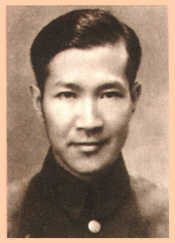 Xian Xinghai (1905-1945), a native of Fanyu, Guangdong Province,composed one of the greatest pieces of music of the 20th century. Since Xian's father died before he was born, the impoverished boy drifted from place to place with his mother. Xian began learning to play the violin when he was over 20 years old. In the beginning, his peers called him Chicken Killer due to the terrible sound of his cheap violin, which resembled a chicken squawk. However, Xian did not give up and soon unleashed his talents. In 1934 he was the first Chinese student to enroll at the senior composition class of the Paris Music Academy. In Paris, Xian spent much time working part time to earn a living. Before he left the academy, Xian became the most outstanding student in the class and received an award from the college. When asked which award he preferred, his reply was simple: meal tickets.
Xian Xinghai (1905-1945), a native of Fanyu, Guangdong Province,composed one of the greatest pieces of music of the 20th century. Since Xian's father died before he was born, the impoverished boy drifted from place to place with his mother. Xian began learning to play the violin when he was over 20 years old. In the beginning, his peers called him Chicken Killer due to the terrible sound of his cheap violin, which resembled a chicken squawk. However, Xian did not give up and soon unleashed his talents. In 1934 he was the first Chinese student to enroll at the senior composition class of the Paris Music Academy. In Paris, Xian spent much time working part time to earn a living. Before he left the academy, Xian became the most outstanding student in the class and received an award from the college. When asked which award he preferred, his reply was simple: meal tickets.
As a student from a weak country, Xian was discriminated against in France. Determined to invigorate his motherland, Xian used music as a revolutionary tool. In the summer of 1935, he declined to remain in Paris and returned to China where he composed the background score for progressive movies, such asRevive,Thunderstorm,SunriseandMidnight Song, refusing payment. Later, he came to Yan'an, where he accepted a position as Dean of the Music Department at the LuxunConservatory of Music. It was in Yan'an that Xian achieved the peak of his artistic creation. Although there was not a single piano in Yan'an at the time, Xian composed some of his most important works there. The Yellow River, which was composed in 1939, was Xian's most representative work.
Xian's reputation is largely built around The Yellow River cantata, a stunning piece of the late Romantic nationalist agitprop. Allegedly written in a cave in just six days during the Anti-Japanese War, this seven-movement cantata (text by Guang Weiran) uses traditional folk melodies, like the image of the mighty Huanghe (Yellow River), as a symbol of Chinese defiance against the Japanese invaders.
In May 1940, Xian went to the Soviet Union for a final-period manufacturing and background musical composition of the full-length documentaryYan'an and the Eight Route Army. In the Soviet Union, Xian led a hard life and was poorly treated. He attempted to go home via Mongolia but was detained and left destitute. (When standing in a queue to buy rice, Xian fainted on one occasion.) Luckily, he was rescued by a girl from the Soviet Union who later became his wife. Due to his exposure to the hard life, lack of nutrition, famine and suffering, Xian died of pulmonary disease on October 30, 1945 at age 40. Xian's music, however, became a motivational force for the Chinese revolution.
Xian is a pioneer of modern Chinese music. Combined with the essence of western music, Xian's works are rich in both Chinese tradition and modern elements. He threw light on the new direction of the trend of Chinese culture. Xian composed music in all major forms (two symphonies, violin concerto, four large-scale choral works, nearly 300 songs and an opera) and wrote many essays about musical theory.
On November 1999, a street in Alamutu of Kazakhstan was named after Xian Xinghai.
